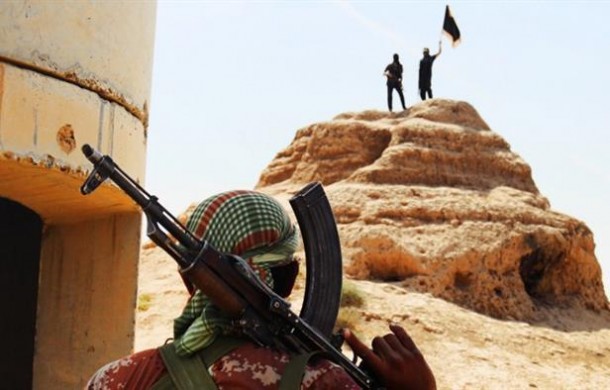IRAQ. With their brutal beheading of photojournalist James Foley last week, the world has been ever more drawn into the world of the Islamic State and the barbarism at the heart of their methods. The group deemed ‘too extreme’ by Al-Qaeda in Iraq has held onto vast territorial gains in the face of U.S. airstrikes, Western armed Kurdish Fighters, the Iraqi army and even the forces of Bashar Al-Assad in Syria. ISIS may be more disciplined, wealthy and politically astute than any militant jihadi organization the West has ever had to contend with. But what exactly do we know about them, their gains thus far, and perhaps how they’ll be challenged?
Synopsis & Gains
Initially composed of the multiple Sunni insurgent groups who hijacked Syria’s popular uprising in 2011, the Islamic State of Iraq and al- sham (الدولةالاسلاميةفيالعراقوالشام) or IS was formed in the Spring of 2013 and branched off from the then closely affiliated Al-Qaeda in Iraq (AQI). From here they became the foremost standalone Islamic Jihad group fighting in Syria. Uniquely ISIS has an unusually high proportion of Westerners fighting in its ranks, with reports of young French and British Muslims leaving their homes to fight in Syria and beyond. Since early June, IS have advanced at a lightning pace taunting the Iraqi army and becoming the shiver on the collective spine of Baghdad. They currently occupy vast amounts of Northern and Western Iraq including the towns of Tikrit and Mosul displacing some 1.5million people. In July the organizations leader Abu Bakr al-Baghdadi, reached out to Sunni Muslims around the world by declaring the establishment of a new Caliphate with al-Baghdadi as Caliph. This announcement would set the stage for yet a further influx of foreign Jihadi fighters from Tunisia, Libya & Saudi Arabia eager to heed al-Baghdadi’s call to arms and fight for the expansion of the new Islamic state.
Finance
ISIS’s fight in Syria was made possible by financial aid provided by wealthy individuals in the Gulf States (notably Saudi Arabia & Kuwait) seeking the destruction of the Baathist Al-Assad regime in Syria. Already a well-financed outfit, the group’s recent territorial gains in Iraq have seen its reported war chest rise from $900 million to an estimated $2bn after a huge haul of currency was taken from the Mosul branch of the Iraqi National Bank when the city was seized in July. Not only that but the Committee to Protect Journalists revealed this week that IS militants have made ‘millions and millions’ of dollars ransoming detained journalists, high ranking locals and foreigners. This is also in addition to the revenue being generated from the oil fields now under their control. IS have become the wealthiest Islamic Jihad group in the world.
Consolidation & Ideology
The Iraqi elections of 05/06 led to the formation of a largely Shiite government which played a key role in the detachment Sunnis Muslims all over Iraq were feeling towards Baghdad. It was this animosity that led to many Sunnis initially welcoming the ISIS insurgents pouring across the border from Syria. Only Sunnis would stand a chance of living under the strict dogmatic adherence to the Quran that ISIS pursues and enforces with lethal effect. Shiites, Yazidis and Christian communities within the grasp of IS are being persecuted in huge swathes. Some 40,000 Yazidis fled in terror from the advancing IS forces after they were denounced as ‘devil worshippers’. They journeyed to Mount Sinjar where some 500 were killed (with reports of many being buried alive) and another 300 women taken as slaves before being saved by Kurdish Fighters. The ancient Christian community from the northern city of Mosul has now left in a large exodus seeking refuge in Iraqi Kurdistan. For them the IS ultimatum was to either convert, pay an unsustainable special tax to remain in the city or be put to death. For now, ISIS has decided to consolidate its territorial gains rather than marching toward the fortified, densely Sunni populated Baghdad.
Shiite-Kurdish Alliance
As in Turkey and Iran, Iraq has a large Kurdish population struggling for autonomy. With some degree of independence as a legacy from the Persian Gulf War, the Iraqi Kurds have made large oil deals with Turkish companies in a bid for greater financial independence from Baghdad. This has put them at loggerheads not only with the Shiite government the capital but with their fellow Kurds in Turkey and Iran striving for similar independence. However, the gravity of the situation has galvanized Iraqi and Turkish Kurds who are now working together to control the 600 miles of border they’re sharing with IS. If the Islamic State is to be repelled without foreign forces being deployed, the Shiite-Kurdish alliance is seen as the very best hope the country has to retain its borders and drive out al-Baghdadi and his brutal militants for themselves.

